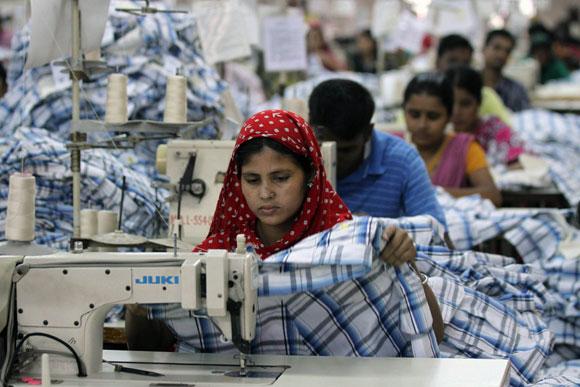No Sign of Revival: Garment Biz Ostagars, Tailor-workers of West Bengal Despair

Image Courtesy: Rediff.com
Kolkata: “We are passing through the worst phase in our 17 years old enterprise BabyGarments.in and we have no clue when we will see the first signs of revival”. This is how a middle-aged woman entrepreneur and proprietor of BabyGarments, Bahnisikha Roy, described her predicament while talking to NewsClick about how her business was doing currently.
“The lockdown phase will be five months old in a matter of days. Our production of the whole range of casuals is already nearly 70% down and my main concern at the moment is whether we will lose production further,” Bahnisikha said. Her outfit is recognised by the Union government as an MSME (micro, small & medium enterprise).
Forty-year-old ostagar [tailor] Moidul Islam, whose business comprises execution of subcontracted garment orders, described the current situation as “extremely difficult” for the ostagars and tailor-workers. “You and I often read about debt-ridden farmers committing suicides. If this situation persists, you may hear about some of the worst sufferers amongst us opting for the extreme step,” Moidul told NewsClick, explaining how suddenly they have found themselves struggling for survival after years of toil to establish the business.
He is a member of the West Bengal Tailors’ Union, which is affiliated to the Centre of Indian Trade Unions, an arm of the Communist Party of India (Marxist). He is one of the hundreds of relatively small ostagars.
A chapter from a thesis on ready-made garment-making [Metiabruz and Bankra] made available online by ShodhGanga, a digital repository of full text theses submitted to universities in India, describes ostagars thus : “[T]he main tailors who are situated on the top of the tailoring work and subcontract out a part of the whole work to one or several subcontractors. They are locally called ostagars. They have an independent marketing arrangement.”
BabyGarments has two units in the North 24 Parganas part of the city—the unit I exclusively handles cutting fabric/cloth and unit II is exclusively for stitching. It has a special arrangement with a Howrah-based company under which the latter sources all its requirements for the whole range of casuals from Bahnisikha’s outfit for marketing in different parts of the country. She does not want to mention the name of the Howrah-based company, which is a wholesaler. Her workforce numbers in the 65-70 range, about 70% of whom are employed on contract basis and the rest are salaried staff.
Till now, she claims, she has not defaulted on their due payments, adding, “They have their families; I should not drive them to starvation. It will hurt me if I fail to clear their dues. But, for how long [can I manage] if the slowdown prolongs? Ever since the problem became acute and transport services came to a grinding halt, there has been no movement of the finished produce and even the reduced level of production in the given circumstances means an addition to the uncleared stocks.”
Moreover, the company, which lifts the entire output of casuals, is not optimistic about the immediate future. “Naturally, their assessment is adding to my concern and the concern of all those working with me,” said the entrepreneur, justifying the premise that the pandemic had made the going most difficult for her business, started in the latter part of 2003.
She started with four workers and four machines. “I was the ‘fifth worker’.” Now, there are about 60 machines. When asked about the turnover for the ongoing fiscal, Bahnisikha expressed her reluctance saying: “Those details are with my administrative staff.”
Moidul painted a grimmer picture of the thousands of middle-level and small-scale ostagars and tailor-workers, a majority of whom belong to the minority community.
“We lost the Baisakhi and Eid business. In the absence of transport facilities, there is a huge accumulation of garments that were readied for the festive occasions gone by. We organised loans from our usual sources including some banks and gold loan outfits to buy the whole range of inputs including fabrics. I am not saying anything about the time we have spent in creating new designs to be able to cater to customers’ changing choices. With stocks lying unsold, we have defaulted on loan repayment schedules,” he said.
General secretary of West Bengal Tailors’ Union Asadulla Gayen said in the last 10-15 days, about 10% of the normal volume of work, some of it Durga Puja-related, has been possible, but “we don’t know whether things will look up from here or the situation will worsen, given the fact that Covid-19 cases continue to surge not only in our state, but also in several other states. The only ray of hope is in the stepped-up testing and a somewhat higher rate of recovery from the ailment post-treatment”.
The dearth of capital will make a return to normalcy difficult for ostagars even when there will be a visible improvement and the authorities muster courage to lift all the restrictions. “We submitted a charter of demands to the state and Central governments. These were: cash assistance of Rs 10,000 for each of the affected persons for six months with Rs 2,500 as the state’s contribution and Rs 7,500 Centre’s; interest-free bank loan of Rs 10 lakh to all deserving units, and waiver of rentals for hired spaces in ‘haats’.
“There has been no response from the authorities to whom the appeals for assistance were addressed. We tried to take deputations, but even that plea has not been heard,” Asadulla told NewsClick, adding that “this attitude of the authorities has saddened us although the authorities collect a fairly hefty sum as taxes from our business. And, it’s better I don’t say anything about the poor state of civic amenities in the areas having a concentration of garment-making units – Garden Reach, Matiabruz and Maheshtala in the South 24 Parganas-part on the city’s outskirts and Bankra in the Howrah district”.
Interestingly, since West Bengal monopolises supply of jewellery-making karigars to all important jewellery manufacturing centres in the country, the story on the plight of ready-made garment making units and tailor-workers won’t be complete without mentioning that the country’s migrant workforce also includes Bengali tailors and textile workers earning their livelihood in other states.
City-based social organisation Bangla Sanskriti Mancha (BSM) played “a connecting role in recent months not only in organising food supplies with the help of local socially active outfits but also in organising the return to West Bengal of about 400 tailor-workers from Pushkar in Rajasthan and about 50 textile workers from Surat in Gujarat”, according to BSM’s secretary Tanmoy Ghosh. BSM’s role ended when the migrant workers alighted from the trains at the Howrah station and the state government undertook the responsibility to take them to their native places.
Handling of the case of the Pushkar-based Bengali tailor workers did not prove difficult as the Rajasthan government cooperated. But the experience in the case of the Surat-based textile workers was difficult as the Gujarat government “mistook the Bengali workers of our state as Bangladeshis and this suspicion made our job delicate and difficult”. “We organised the return of migrants from some other states including Uttar Pradesh, but we did receive cooperation from them”, Tanmoy told NewsClick. Asked about the status of BSM, he said, “We are a social organisation carrying out our activity with funds we receive as donations and contributions. We have cordial relations with the Left and the Right.”
Also read: Nationwide Call to ‘Save India’ Observed by Over 1 Crore Working People: CTUs
Get the latest reports & analysis with people's perspective on Protests, movements & deep analytical videos, discussions of the current affairs in your Telegram app. Subscribe to NewsClick's Telegram channel & get Real-Time updates on stories, as they get published on our website.
























